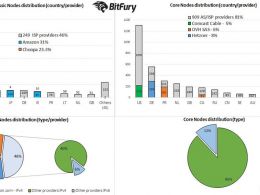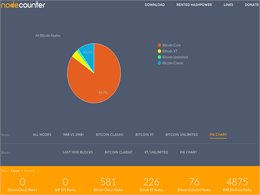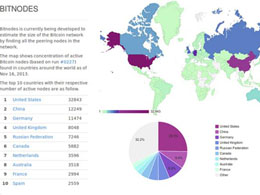
What Are Bitcoin Nodes and Why Do We Need Them?
It's well known that bitcoin is designed as a decentralized peer-to-peer (P2P) network. However, what's often lost in translation is the sheer amount of machinery that is needed to maintain this global infrastructure. For example, in order to validate and relay transactions, bitcoin requires more than a network of miners processing transactions, it must broadcast messages across a network using 'nodes'. This is the first step in the transaction process that results in a block confirmation. To function to its full potential, the bitcoin network must not only provide an avenue for....
Related News
Since its launch, Bitcoin Classic's node count has steadily increased. The latest release of the alternative Bitcoin implementation even topped the charts, with almost 3,000 Bitcoin Classic 0.12 nodes reachable on the network. But a closer look at these statistics reveal some odd details. First, IP-data suggests that many Bitcoin Classic nodes might not really be many Bitcoin Classic nodes at all. Instead, a single node could use multiple IP addresses to spoof total node count. This possibility appears more likely in light of the observation that very few Bitcoin Classic nodes seem to be....
Bitcoin nodes are an interesting trend to keep an eye on, as the digital currency’s network needs a lot of active nodes around the world to relay transactions. Up until this point, several people were running various types of Bitcoin nodes, including Bitcoin Core and Bitcoin Classic solutions at the same time. The redesigned NodeCounter website will eliminate duplicate nodes from appearing on the list, and show a clear representation of which code is leading the charge at any given time.
Editor’s Note: In addition to Amazon Web Services, BTCC also hosts nodes using Alibaba Cloud Computing Services, and is testing deployment of nodes on Rackspace. People who have been following the Bitcoin news recently will remember how Chinese exchange BTCC recently deployed an additional 100 nodes on the network. By spreading out these nodes all over the world, the Bitcoin network became a bit more decentralized than before. However, all of these Bitcoin nodes are hosted on Amazon Web Services, which is kind of centralizing the effort a bit.
The huge growth in Bitcoin has almost everything to do with the Chinese's recent interest in the digital currency. According to Bitnodes, it looks like China has overtaken Germany in having the second most Bitcoin nodes in the world, with just over 12,000 being the estimate. China trails behind the United States, which has close to 33,000 nodes at this time - so they've still got some catching up to do. Bitcoin nodes are critical parts of the Bitcoin network. These nodes are typically run by ordinary people or mining groups and are responsible for updating the ledger (block chain) with the....
Anonymous Tor-enabled Bitcoin nodes normally make up as much as 25% of totally reachable Bitcoin nodes. According to the latest data from node monitoring resource Bitnodes, Tor-enabled Bitcoin (BTC) nodes are back to normal following almost a full-swing crash in early January 2021. As of Jan. 13, the number of reachable Tor-based BTC nodes amounted to 2,581, up from as few as 122 nodes on Jan. 9.Based on Bitnodes data, Tor-enabled Bitcoin nodes make up a significant part of the Bitcoin network, normally accounting for about 25% of totally reachable running nodes. According to the latest....





